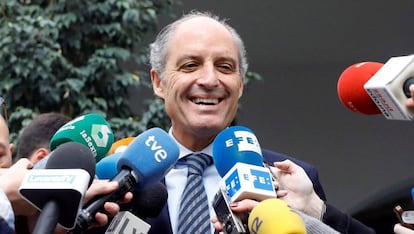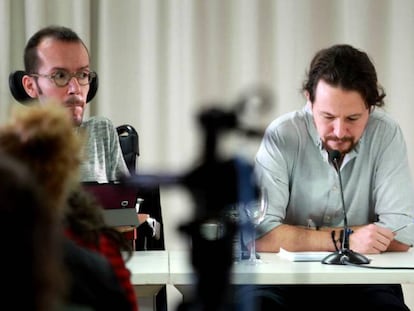The long shadow of Popular Party corruption
As ongoing court cases are revealing, Prime Minister Rajoy¡¯s election wins do not exonerate him from past wrongdoing in his party

The Valencia branch of the Popular Party (PP), under the leadership of one-time premier Francisco Camps, played a determining role in ensuring Mariano Rajoy¡¯s political survival at the helm of the national party in 2008, after he lost the general elections for a second time to the Socialist Party¡¯s Jos¨¦ Luis Rodr¨ªguez Zapatero and faced internal opposition led by party veteran Esperanza Aguirre, two facts that were making the ground shake under his feet. At a party rally organized by Camps that year, the latter¡¯s unequivocal support was the key that brought rebel elements back in line and shored up support for Rajoy at his weakest moment. If the 2004 defeat at the polls had been a collective party failure following the Madrid terrorist attacks of March 11, the 2008 defeat was entirely personal, and that was the reason why Rajoy was facing his greatest internal challenge to date.
Camps was at the helm of a region that became a symbol of corruption during Spain¡¯s bubble
Soon after that, the investigation into the G¨¹rtel network began, and so did accusations that Camps had accepted gifts. Recorded conversations dating from those times have become iconic examples of the PP¡¯s corruption: ?lvaro P¨¦rez ¨C head of Orange Market, a company that was a leading Valencia government contractor ¨C and Francisco Camps mutually described each other as ¡°soul mates,¡± who loved one another dearly. And Rajoy himself uttered a memorable sentence aimed at the Valencia premier at the time: ¡°I will always be behind you, or in front of you, or beside you, it¡¯s all the same to me. Thanks, Paco.¡± At another time Rajoy declared that G¨¹rtel was ¡°not a PP scheme, but a scheme against the PP.¡±
This marked the beginning of Rajoy¡¯s policy of publicly defending his closest aides until he had no choice but to let them fall ¨C all the while trying to emerge unscathed himself. But history and our memories must serve to recall Rajoy¡¯s alliance of survival with Camps. The hearings now taking place at Spain¡¯s High Court in connection with one section of the G¨¹rtel case confirm prosecutors¡¯ worst fears: first it was ?lvaro P¨¦rez; then nine more businessmen who made cash payments; then Ricardo Costa, a former secretary general for the Valencia PP, who pointed their fingers at Francisco Camps as the top figure behind the regional branch¡¯s illegal financing system. This week saw Costa admit that he paid Orange Market in cash that he himself received from those businesses. He shielded former national treasurer Luis B¨¢rcenas and other national officials from any responsibility, which he laid entirely at the feet of Francisco Camps and other high-ranking officials of the Valencia government at the time.
Rajoy is not exonerated from accountability by his subsequent victories at the polls
Camps himself denied the accusation on Wednesday, and a court decision is still pending. But after hearing it from nine businessmen, from members of the corrupt network and from the Valencia PP secretary general at the time, there can be little room for doubt in the minds of judges at the High Court.
This is no trivial matter. Francisco Camps was more than just a pillar for Rajoy. He was also at the helm of a region that became a symbol of the corruption that went on during Spain¡¯s economic boom. When the bubble burst in dramatic fashion, entire sections of society were forced to send their children to schools housed in portable buildings, for lack of proper classrooms. The Valencia model was a failure, as was an irregular financing model that is now sitting in the dock after altering the PP¡¯s accounts, and altering Spanish democracy itself. The rigorous attitude now displayed by the government toward the underground economy, tax evasion and undeclared cash is in contrast with the practices of a party that, far from being a role model, exhibited an intolerable adulteration of its own accounts for a European democracy. In 2011 Rajoy won the elections against a PSOE that was exhausted and behaving erratically in the midst of the crisis. But today we may certify that his victory came on the back of an illegal financing system and that he is not exonerated from accountability by his subsequent victories at the polls.
English version by Susana Urra.
Tu suscripci¨®n se est¨¢ usando en otro dispositivo
?Quieres a?adir otro usuario a tu suscripci¨®n?
Si contin¨²as leyendo en este dispositivo, no se podr¨¢ leer en el otro.
FlechaTu suscripci¨®n se est¨¢ usando en otro dispositivo y solo puedes acceder a EL PA?S desde un dispositivo a la vez.
Si quieres compartir tu cuenta, cambia tu suscripci¨®n a la modalidad Premium, as¨ª podr¨¢s a?adir otro usuario. Cada uno acceder¨¢ con su propia cuenta de email, lo que os permitir¨¢ personalizar vuestra experiencia en EL PA?S.
?Tienes una suscripci¨®n de empresa? Accede aqu¨ª para contratar m¨¢s cuentas.
En el caso de no saber qui¨¦n est¨¢ usando tu cuenta, te recomendamos cambiar tu contrase?a aqu¨ª.
Si decides continuar compartiendo tu cuenta, este mensaje se mostrar¨¢ en tu dispositivo y en el de la otra persona que est¨¢ usando tu cuenta de forma indefinida, afectando a tu experiencia de lectura. Puedes consultar aqu¨ª los t¨¦rminos y condiciones de la suscripci¨®n digital.










































